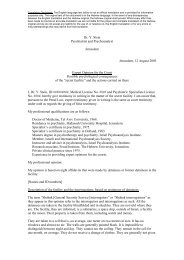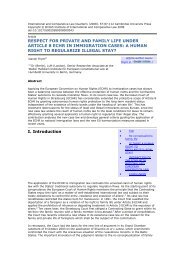HCJ 10650/03 Abu Gwella et. al v
HCJ 10650/03 Abu Gwella et. al v
HCJ 10650/03 Abu Gwella et. al v
You also want an ePaper? Increase the reach of your titles
YUMPU automatically turns print PDFs into web optimized ePapers that Google loves.
138. It is not necessary to expand on the great importance of publishing the decisions and<br />
procedure of state authorities. We see from the description of events s<strong>et</strong> forth above<br />
that the Respondents took care not to publish its changing policy, forcing the residents<br />
to discover the changes that had been made regarding their most basic rights and<br />
needs, over which the Respondents were entrusted, only after frequent visits to the<br />
Ministry of the Interior’s office or by announcements published by human rights<br />
organizations. Unfortunately, recent attempts to discover the procedures for arranging<br />
the status of children of residents who were born outside of Israel, or if such<br />
procedures in fact exist, were in vain.<br />
139. As described above, it was not until the correspondence with clerks in the office of<br />
Respondent 3 that the P<strong>et</strong>itioners learned about the refus<strong>al</strong> of Respondent 3 to register<br />
children in their situation. The response of Respondent 3 was received only after<br />
repeated requests by P<strong>et</strong>itioner 6. Questions asked by P<strong>et</strong>itioner 6 in its l<strong>et</strong>ters of 14<br />
August and 29 September 2002 were not answered.<br />
140. As a result of the failure of the Respondents to publish their decisions, many families<br />
that are not represented wait in vain to register their children, and it is very doubtful<br />
wh<strong>et</strong>her other residents in the same situation as the P<strong>et</strong>itioners, but who do not have<br />
representation, would receive any reply whatsoever from Respondent 3. Also,<br />
formulating a decision in writing and publishing it provides further guarantee that<br />
discr<strong>et</strong>ion lies at the foundation of the decision.<br />
141. The right of the public to know and receive information from the state authorities as<br />
regards their actions is a right s<strong>et</strong> forth expressly in Israeli legislation and case law.<br />
The public’s right to know is a necessary means for public review of the actions of<br />
state authorities; the right is important to ensure public trust in the authorities’ actions,<br />
for there can be no public trust where actions are taken in secr<strong>et</strong>. The public’s right to<br />
know <strong>al</strong>so entails the right of every member of the public to have direct access to<br />
information that the state authorities gather in carrying out their functions. The<br />
corollary of the right of the public to know is the “duty of persons holding public<br />
positions to provide information to members of the public” (<strong>HCJ</strong> 1601-1604/90, Sh<strong>al</strong>it<br />
<strong>et</strong> <strong>al</strong>. v. Peres <strong>et</strong> <strong>al</strong>., Piskei Din 41 (32) 365).<br />
Regarding the obligation to publish criteria and procedures, see <strong>HCJ</strong> 5537/91, Efrati v.<br />
Ostfeld <strong>et</strong> <strong>al</strong>., Piskei Din 46 (3) 501; <strong>HCJ</strong> 3648/97, Stemkeh <strong>et</strong> <strong>al</strong>. v. Minister of the<br />
Interior <strong>et</strong> <strong>al</strong>., Piskei Din 53 (2) 728, 767-768.<br />
142. We see from <strong>al</strong>l the above that the Respondents must act, as regards children born in<br />
the Occupied Territories, in accordance with the guidelines s<strong>et</strong> forth in Section 12 of<br />
53









